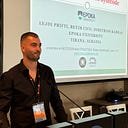WebSummit 2023: Where are AI and Web3 heading to?
In this article, I will give you an overview of the most fascinating talks that took place at WebSummit 2023. I participated in the WebSummit, which began on November 13 and ran for three days, ending on November 16. I’ll be presenting brief summaries based on notes I took at the meetings about AI and Web3.

This WebSummit’s primary focus was unavoidably artificial intelligence (AI) and its commercial advantages.
It was said that generative AI greatly aided creators. The argument against this strategy, though, was that it would stifle originality. Content would become monotonous, universal, and unoriginal as more and more creators turned to artificial intelligence to assist them in producing fresh material.
In addition, a lot of CEOs and owners of brand agencies forecast that generative AI will soon become a tastemaker. It will affect the choices and inclinations of the general public and the market.
In order to combat the detrimental effects of generative AI, firms and people must be creative in order to thrive in the marketplace. Talkers also emphasized the need of valuing creativity above productivity. It was stated that creativity will assist generate two times as much income for the company as productivity using AI would.
Keep this in mind if you decide to stop reading this post right now.
In the future, creativity will be extremely valuable.
One significant issue arises when using AI on corporate data. Since the data will be used by the other company’s machine learning model for operations, it is no longer private.
According to Project Liberty, people should be able to own their data on the new Internet. The responsible development of the internet of the future — one that is planned and managed for the benefit of all — is being advanced by Project Liberty.
Consider applying AI to your company’s data. AI will be fully informed as soon as you grant it access to your data. It will most likely discover your competitive advantage as well, and in the event of a data leak, everyone on the planet will be made aware of it. That incident greatly jeopardizes your business.
The ability to control one’s own data is regarded as the breakthrough of the future.
The WebSummit featured six predictions on the future of AI, the most significant of which are the final four.
- OpenAI will lose the throne.
- AWS will own the future of AI.
- We will move from broad to narrow uses cases of AI. There will be a deep learning model specialized for a specific case.
- Video games will get improved a lot with the new graphics AI produces.
- The largest copyright dispute ever will happen soon. It will be essential to defend creativity and originality against AI. AI has an intellectual property problem that must be resolved. It is vital to safeguard this data from an AI that will be expected to learn to write as me, create as you, develop as someone else, etc., as many models are trained on data that individuals produce, on text authors write, and on content creators make.
- AI will never take our jobs, as long as we keep our creativity. Many CEOs believe that rather than waiting for AI to arrive, it is already here. They advise becoming at ease with it and making teams profit from it.
Marketing will be among the most intriguing applications of AI.
Consider using AI to certain marketing data. These are information gleaned from the activities that visitors to your website take. AI might identify correlations between it that your marketing managers or you would not be able to. It would provide you improved strategies for your advertising efforts or even modifications to your goods in order to better meet the wants of your customers.
Mobile gaming is thought to be the direction that esports will take in the future. Everyone has the chance to be eligible and take part. As long as individuals enjoy competing, mobile gaming will account for about 70% of total gaming income. XR will become more widely available and a reality in the future.
If you are interested in Web3, this topic is for you. Every blockchain has a trilemma to solve. The blockchain trilemma, as coined by Ethereum co-founder Vitalik Buterin, refers to the trade-off between three critical aspects of blockchain technology: security, scalability and decentralization.

Up until Algorand, no blockchain had been able to overcome the trilemma. Algorand is a new monolithic blockchain that proposes balancing the three essential elements of security, scalability, and decentralization in order to resolve the trilemma.
It recommends achieving this by utilizing Pure Proof of Stake, a brand-new technique that isn’t shown in the above graphic. The use of VRF for the random selection of validator nodes is a crucial component of this new protocol.
A cryptographic function known as a verifiable random function (VRF) accepts a set of inputs, computes them, and outputs a pseudorandom result along with an easily verifiable evidence of validity.
The blockchain allows for open participation, and Algorand can handle 30,000 transactions per second. The set fee of each transaction is 0.001 ALGO, or the cryptocurrency of its own.
Developers may work on it with great ease thanks to the test networks and tools.
When I start exploring with it, I’ll write more about it in an other post.
Web3 security is still a concerning problem. The three primary Web3 vulnerability categories are as follows:
- Logic (including cryptographic errors) — occur at 7% of cases
- Implementation & Bugs — occur at 66.3% of cases
- Infrastructure & Key Management — occur at 26.6% of cases
The primary infrastructure problem continues to be private key management. Your system will be more secure overall if you manage the private key with greater care.
Twitter: https://twitter.com/lejdipr
Website: https://lejdiprifti.com/blog/
Support the content: https://www.buymeacoffee.com/lejdiprifti
Thank you!
